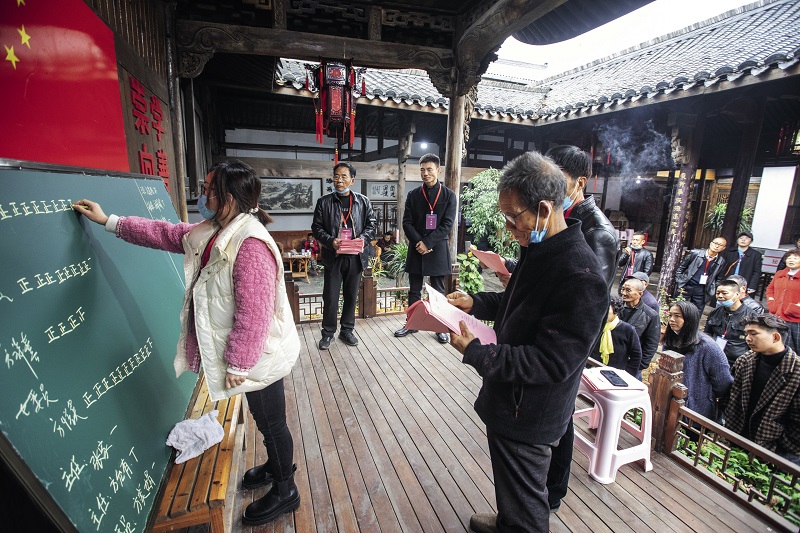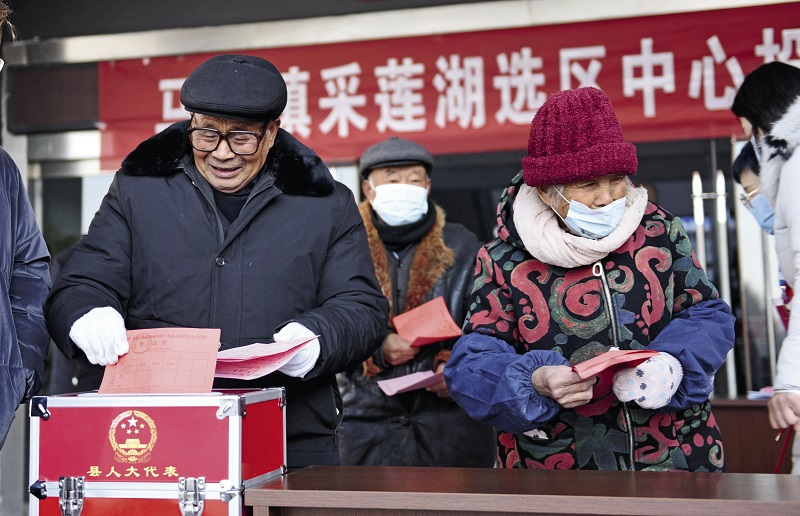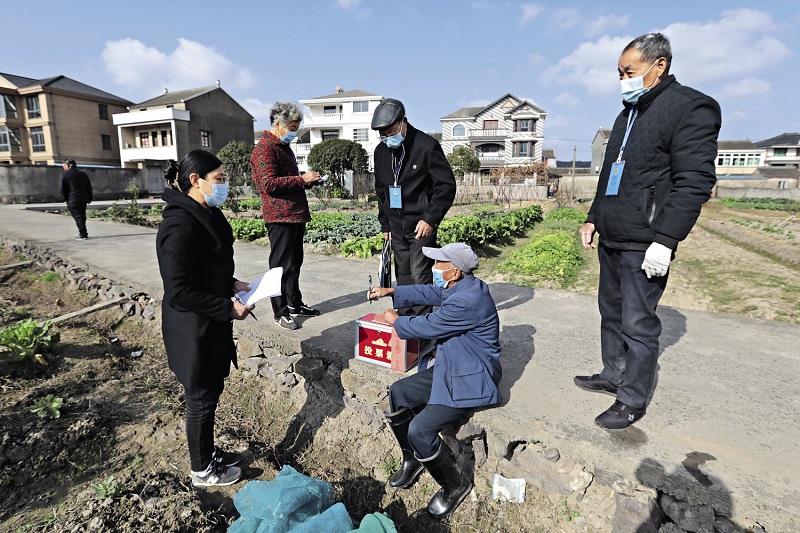
Villagers in Qianxibian Village of Jinhua City, Zhejiang Province exercise their democratic right to elect village cadres on November 26, 2020.
To the question “Is China a democracy or not,” history has already given the answer. When the People’s Republic of China (PRC) was founded in 1949, it signified that the country had already made great strides in moving from its previous feudal autocracy which had continued for thousands of years to a people’s democracy.
When the Chinese people were trapped in dire straits, it was the Communist Party of China (CPC) that rallied them in fighting back. Where were those so-called democracies which now point fingers at China? They just made things worse by providing funds and weapons to aid the autocratic reactionary ruling administration in China at the time in slaughtering the Chinese people. How could such democracies and politicians from these countries be in a position to make comments on democracy in China? It is the 1.4 billion Chinese people who have the say in this issue.
After the Revolution of 1911, which brought China’s feudal system to an end, Western democracy was trialed in China, but turned out to be a failure. In founding the PRC, the Chinese people, having learned the lesson the hard way, didn’t follow the Western multi-party system, two-party system, or parliamentary system. The CPC also found the flaws of the Soviet political system during its revolutionary practice, and therefore chose not to copy the political system of the former Soviet Union and Eastern European countries when it founded the PRC and carried out socialist transformation.
Chinese communists, who have been adapting the basic principles of Marxism to the Chinese context, were determined to explore their own path of democratic political development. The CPC made China a socialist country of the people’s democracy. It established a set of systems for democracy with Chinese characteristics, which include the system of people’s congresses, the system of CPC-led multiparty cooperation and political consultation, the system of regional ethnic autonomy, and the system of grassroots democracy. The CPC has been able to unite forces in the broadest possible way with its patriotic united front.

Eighty-two-year-old Liu Zonglian (first left) places his vote in the designated box at the polling station in Cailianhu Electoral District in Matou Town, Tancheng County, Linyi City, Shandong Province on December 27, 2021.
In the process of establishing, improving, and consolidating China’s democratic political system with Chinese characteristics, the CPC has led the people to create a whole-process people’s democracy. At the celebration of the 65th anniversary of the founding of the Chinese People’s Political Consultative Conference (CPPCC) on September 21, 2014, Xi Jinping, general secretary of the CPC Central Committee, elaborated on China’s democratic system. He said that under China’s socialist system, people’s affairs are discussed by the people, and that reaching the greatest common divisor of the will and demands of the whole society is the true meaning of people’s democracy. He made an insightful comment, “When the people only have the right to vote, but no right for extensive participation, and when the people are only awakened in voting and sent back to dormancy after the voting, democracy is only for formalities’ sake.” This is, in essence, the idea of whole-process people’s democracy.
Xi made the idea official when visiting a civil center in Shanghai on November 2, 2019. “We are following a socialist path with Chinese characteristics to political development, and people’s democracy is a democracy that is implemented in the whole process,” Xi said.
In March 2021, this major political concept was enshrined in the law. In his speech at the grand gathering for the 100th anniversary of the founding of the CPC, Xi stressed efforts to implement the people-centered approach to develop and advance the whole-process people’s democracy.
Xi systematically expounded on what the whole-process people’s democracy is at the central conference for the work of people’s congresses on October 13, 2021. There is a complete set of systems and procedures for whole-process people’s democracy, and democracy is indeed upheld throughout the whole process of decision making in political affairs, he said. “It is the most extensive, real, and effective socialist democracy,” Xi said.
Civil and political rights are always the focus of the study of human rights theories with Chinese characteristics, especially in fighting back some biased accusations against China regarding human rights. The concept of whole-process people’s democracy can provide specific and key inspiration for expanding research on human rights theories with Chinese characteristics, especially issues regarding civil and political rights in China.
For example, extensive consultation is a defining feature of the whole-process people’s democracy. The general public can be a part of political decision making thanks to the system. The law stipulates that a decision can only be made by the Party or the government after political consultation.
To this end, after the 18th National Congress of the CPC, an extensive and multi-layered institutionalized system for political consultation has been formed. The system offers channels for political parties, people’s congresses, government departments, CPPCC local committees, people’s organizations, grassroots organizations, and social organizations to contribute their suggestions and opinions on political affairs. With such a system of consultative democracy, the CPC and the government can first learn about opinions from various sectors of society during the process of decision making, and reach a consensus as broad as possible.

The election staff of Xinfeng Village, Jintang Town, Dinghai District, Zhoushan City, Zhejiang Province talk with local residents working in their fields to ensure every person participates in the election on December 13, 2021.
A case in point is the formulation of the 14th Five-Year Plan for economic and social development. Consultation meetings with various democratic parties and the All-China Federation of Industry and Commerce were held. General Secretary Xi personally presided over a series of symposiums to heed advice from entrepreneurs, non-Party representatives, experts in the economic and social fields, scientists, experts in the fields of education, culture, health, and sports, local Party and government chiefs, and grassroots representatives. A special online channel was set up to listen to the opinions and suggestions of the vast number of netizens. In this way, opinions and demands of the general public are taken into consideration in the country’s top-level design. Statistics showed that, more than 1 million suggestions on state affairs were received online. The opinions contributed at various symposiums and online platforms have become an important basis for policies and decisions at the top level. Therefore, China’s democracy is characterized by a consultative democracy, in which the people can participate extensively in the entire process of decision making.
The whole-process people’s democracy, simply put, combines electoral democracy with consultative democracy. Throughout the whole process of democracy from the selection of government officials, decision making, legislation, administration, and supervision, people can have their democratic rights exercised in accordance with the law.
Such democratic rights include the right to vote and stand for election, the right to know, participate in, express opinions, and oversee state and social affairs, the right to criticize and make suggestions to state organs and state functionaries, as well as the freedom of speech, of the press, of assembly, of association, of procession, of demonstration, and of religious belief. The whole-process people’s democracy is to ensure these civil and political rights enjoyed by the people by offering them a say in state affairs.
The whole-process people’s democracy is not only about ensuring people enjoy their civil and political rights, but also about ensuring people’s rights regarding the economy, politics, culture, society, and ecological civilization. It ensures people can participate extensively in the administration of the state and social affairs and economic and cultural undertakings, and fully exercise their democratic rights in their daily lives. Everyone has multiple roles in democracy. They can contribute their ideas and suggestions regarding state affairs, social governance, and everyday life and make their voice heard in every aspect of political and social lives.
Over the past years, China has also established a mechanism for the people to directly participate in the administration of state and social affairs in accordance with the democratic concept of “staying responsive to the call of the people.” Some local government departments have adopted the mechanism, which makes sure that “public complaints are handled without delay.” The mechanism has been added into the law. Through laws and mechanisms like this, people’s basic human rights are guaranteed. There are many more such cases at the local and grassroots level. In this sense, the whole-process people’s democracy has comprehensively and extensively promoted the development of China’s human rights cause.
LI JUNRU is former vice-president of the Party School of the Central Committee of CPC.